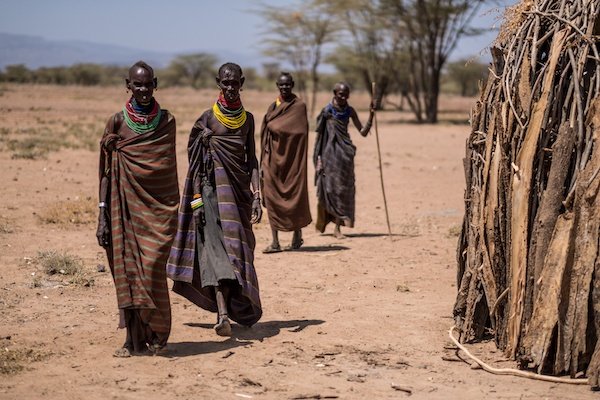Some diseases get overlooked in terms of research, funding, and treatments, essentially because they primarily affect people in the world’s poorest countries.
That injustice means millions of people end up suffering from painful, life-changing illnesses that are often treatable and completely avoidable — further trapping them in poverty.
Trachoma is one such disease, part of a group of conditions called Neglected Tropical Diseases — and it is the world’s leading cause of blindness from infection.
The painful eye condition is caused by bacteria that can be passed through contact on hands, bedding, and clothing, and it can also be carried by flies, according to the World Health Organization (WHO).
If left untreated over time it causes scarring to the eyelid that pulls the eyelashes inward, so with every blink they scrape against the eye. This advanced form of trachoma is called trichiasis, and the pain can be so intense that many people resort to pulling out their eyelashes to reduce the agony of blinking.
A UK aid-funded project has been focused on treating and eventually eliminating trachoma in low income countries — and it has delivered 11.7 million treatments in just two years.

The project was carried out by Sightsavers, a charity working on improving eyesight and fighting eye diseases around the world, and other partners including the Fred Hollows Foundation which works to end avoidable blindness, between May 2018 and May 2020.
UK aid provided £20 million through the Commonwealth Fund to support 10 country governments with the highest prevalence of trachoma out of the 54 nations in the Commonwealth.
That meant working on strengthening health systems and fighting the spread of the disease in Kenya, Kiribati, Nauru, Nigeria, Pakistan, Solomon Islands, and Tanzania, where the disease is an ongoing problem.
Meanwhile they also worked with Tonga, Vanuatu, and Papua New Guinea — three countries which were closer to eliminating the disease — to help them be declared trachoma-free.
As well as reaching communities with treatments to stop the disease from spreading, doctors were able carry out nearly 32,000 surgeries on patients with advanced forms of trachoma.
One patient who required surgery is Ipo, who lives in a village in Turkana, Kenya. She explained she had been really struggling with her day to day tasks due to the sore infection. “This damaged eye really affects me, sometimes it becomes so painful,” she said. “When your eyes are sick, you cannot do anything.”

Ipo’s mother didn’t seek treatment when she too suffered from trachoma, and eventually lost her eyesight completely. “When my mother started like this, people said she had been witched, that it wasn’t an issue for the hospital. They ignored it and that led my mother to blindness.”
One of the project’s aims was to train local people about the dangers of trachoma, how to recognise it, and get treatments for infections, so that progress can continue after funding for the project ended.
Health care workers and community volunteers used a strategy called the SAFE method — which stands for surgery, antibiotics, facial cleanliness, and environmental improvements, such as improved sanitation — to combat trachoma from all angles.
Ngurotin Lung’Or, also based in Kenya, volunteered to help her local community deal with trachoma. She teaches good hygiene and helps organise surgery for those she has identified as needing it.
“My hope is that when trachoma is eliminated, everyone will be able to do the work they depend on to look after his or her family, that’s my happiness,” she said.
Samson, a surgeon in the area, explains that the surgery for advanced trachoma is “straightforward” and can be done sitting in a car or under a tree — emphasising how unnecessary it is for people to be forced to suffer in silence with the disease. He added that the best part of his job is being able to restore people’s sight.
As well as delivering treatment and training volunteers to help their communities, the Commonwealth Fund helped strengthen data collection in local health systems — meaning that more targeted approaches can be continued to further stamp out the disease.
Sightsavers reports that of the 270 districts across the 10 different countries they worked, 90 reached “elimination thresholds” for trachoma, meaning they are close to reducing its spread to the point it will disappear from these areas.
The work has certainly had life-changing benefits for those finally receiving medical care.
Ipo spoke about how she was after her surgery: “I can see! I can see very far, there’s a lot of difference,” she said. “I am very grateful and I pray to God to bless these people. They came into my life and found me suffering in this condition. They helped me.”
This story is part of a new series from Global Citizen called “UK Aid Works” — a collection of stories about health care development projects supported by Britain’s aid budget, collated by Action for Global Health UK (AfGH), an influential membership network convening more than 50 organisations working in global health.
In September, the Department for International Development (DfID) merged with the Foreign Office (FCO) to form the Foreign, Commonwealth, and Development Office (FCDO). At a time when the future of poverty-focused aid is under threat, it’s crucial that we hold onto programmes like these that focus on the world’s most vulnerable people. These stories are about the types of initiatives that we must strive to protect. You can check out more stories like this here — and call on the foreign secretary to ensure that aid is transparent and accountable here.